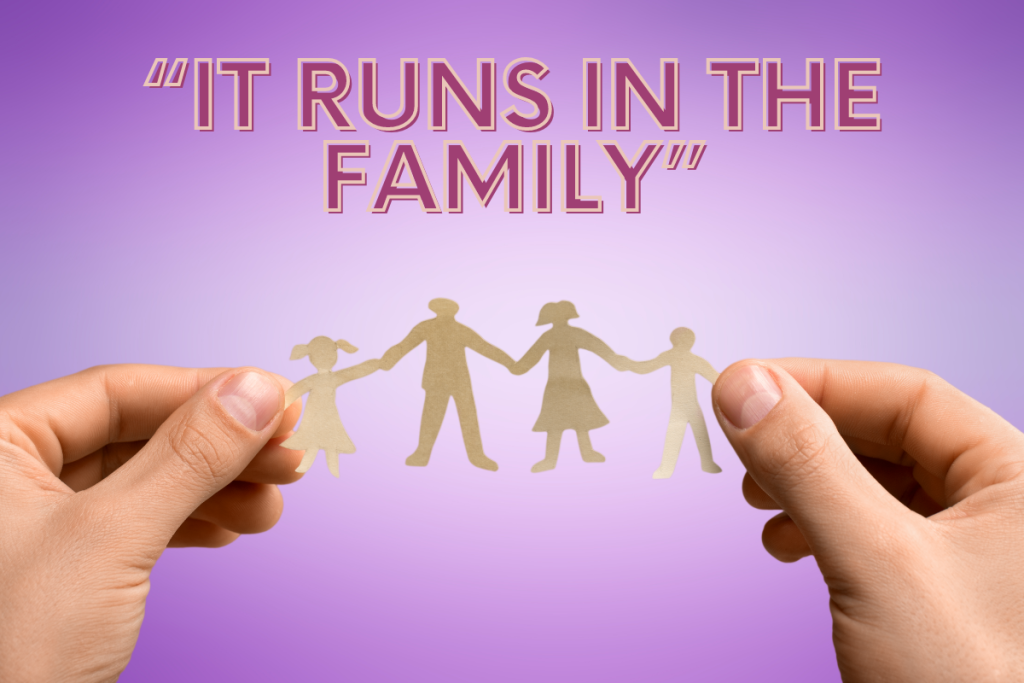A New Take On Life

“It runs in the family…”
National Recovery Month:
Promote and support an understanding of mental health and substance use disorders. The official color for National Recovery Month is purple. The theme for 2023’s Recovery Month is: Hope is Real. Recovery is Real. Please visit www.samhsa.gov/recovery-month to find out ways that you can join in the celebration of healing and freedom from addiction!
Addiction has been described in a variety of different ways over the years: a moral weakness, lack of willpower, a lack of self-control, an inability to control the world, a physical sickness, and a spiritual illness. The term addiction has moved on from its once very limited focus of drugs and alcohol to a broader definition that includes food/eating disorders, gambling, sex/porn, shoplifting, self-harm such as cutting, work, spending, and many others. Nearly every human being on earth is looking for the one same thing, the deep desire to feel happy and at peace with their mind and soul. Addiction then at its very core is a (in my opinion) a spiritual issue are looking for something to fill the void we have in our lives. We find at times to be happy and fulfilled and will feel this peace but once it slops away and leaves us, we feel sadness again, which is the normal cycle of life. Addiction at times is used to control the uncontrollable. By changing our mood, we believe we can control the things around us, that cycle of life that includes sadness and other negative emotions. Developing an addiction can happen to someone due to many factors, including socioeconomic, environmental, cultural influences, and other barriers. While most people can have a beer or cocktail, buy a lottery ticket, or even experiment with drugs without becoming addicted, there are some who have a certain personality type that are wired to spiral into addiction the moment they take their first sip, smoke, or bite. Have you ever wondered; do I have an addictive personality?

I think that term can be tossed around a lot, including the phrase “alcoholic gene.” While yes, genetics and certain personality traits play a factor, “addictive personality” is not an actual psychiatric diagnosis. Research studies are ongoing but, what we do know is that you may have something in your genes. There was a study done on twins who were born to addicted parents but then adopted by families with no addictions and scientists did learn that genes are responsible for about half of a person’s likelihood for also becoming addicted. We also know that genes alone are not enough to prove that even if you came from a family with a long history of addiction that you are bound to follow that same path. Many other factors come into play such as friends, your education, your social support, a church family, and the environment you grew up in. “You can’t exhibit addictive behaviors to a substance unless you’re exposed to that substance,” says J. Wesley Boyd, MD, PhD, an assistant professor at Harvard Medical School. t is likely that if you have one addiction you will have more than one. If you were raised in a home where alcohol and drugs were available to you, you’re probably going to be addicted to cigarettes as well. We should also be aware of externalizing behavior and internalizing symptoms. Adolescent self-report studies have shown that externalizing behavior in childhood and adolescence are associated with an increased risk for alcohol, and cannabis use disorders, as well as nicotine use disorder in adulthood.Greater misbehavior at school, deviant behavior, being sexually active, antisocial behavior, and lower perceived consequences of antisocial behavior are all associated with alcohol abuse and dependence in adulthood. Depressive symptoms in adolescence have also been linked to both alcohol dependence and nicotine dependence later in life. We must also take into consideration that people who have neurodevelopmental delays as well as ADHD and Autism are at risk of developing SUDs in adulthood as well. Progress is always being made in identifying risk factors for addiction, but the fact of the matter is we can heal and recover and that to me is far more important than the reasons’ why someone becomes addicted. Despite our past, or present, we can change and heal if we make that choice. If you believe that you’re struggling with an addiction, please reach out to a professional that can help you identify your own complex issues and your “why” of possible change.
SEPTEMBER BOOK RECOMMENDATION
“Healing the Addictive Personality: Freeing Yourself from Addictive Patterns and Relationships”
By Dr. Lee Jampolsky” by Molly Siple, MS, RD
Since 1991, Dr. Lee Jampolsky’s self-help classic Healing the Addictive Mind has given well over 100,000 people around the world the tools to create significant change in their lives. Now he continues his proven and trustworthy blend of practical and positive psychology with HEALING THE ADDICTIVE PERSONALITY. Dr. Jampolsky’s straightforward approach, based on firsthand experience, presents ways of healing addictive thinking, behavior, and destructive relationship patterns with forgiveness, compassion, and the potential for limitless opportunity through an eleven-week action plan.
A personal note from the author: “Many people live in a self-imposed prison and don’t even know it. Idid. For years I was so busy building walls I did not see that I was imprisoning myself behind them. My addictive thinking and behavior became the bars of my cell. I denied feeling empty inside and instead looked for new things to acquire, substances to take, and goals to achieve in order to feel better about myself. Sometimes I felt momentarily free, powerful, and whole, but in the end my addictive cycle only compounded my loneliness and despair. If you recognize this pattern in yourself, this book is addressed to you. Today, I am able to tell you I now know what true freedom and happiness are and I offer the path that I intend to follow every day of my life.”
Jessica Pottorff, MS, MA, T-LMHC, CADC

Jessica holds a Master of Arts degree in Christian Counseling of Substance Abuse and Addictive Disorders as well as a Master of Arts degree in Clinical Mental Health Counseling. She is also a certified alcohol and drug counselor. Jessica is currently accepting new patients; please use the contact form if you would like to schedule a session with her.
Jessica is passionate about working through codependency issues, guilt and shame, and spiritual issues and allows God and Scripture to empower clients to see their potential and to find their identity in Christ. Jessica is authentic and builds rapport quickly with her clients by being personable, compassionate, and Christ-centered. She has a passion to help people develop a deeper relationship with God as they pursue wholeness in all areas of their lives.

